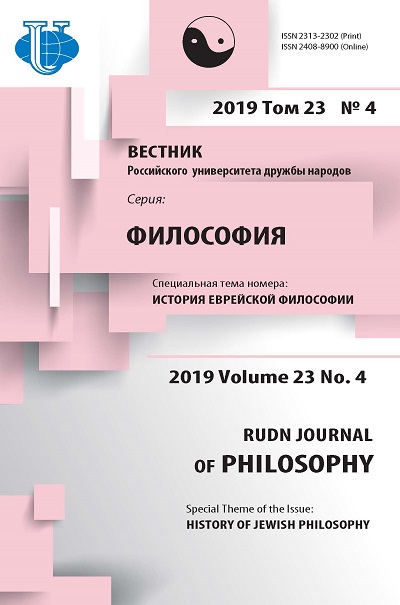Intelligible Character and Revelation of Person: F.W.J. Schelling “Psychological Scheme”
- Authors: Rezvykh P.V.1
-
Affiliations:
- National Research University - Higher School of Economics
- Issue: Vol 23, No 4 (2019): HISTORY OF JEWISH PHILOSOPHY
- Pages: 461-470
- Section: History of western philosophy
- URL: https://journals.rudn.ru/philosophy/article/view/22612
- DOI: https://doi.org/10.22363/2313-2302-2019-23-4-461-470
- ID: 22612
Cite item
Full Text
Abstract
This article focuses on analysis of a handwritten fragment by F. W. J. Schelling “Psychological scheme” (1837-1839), which is a study of main principles of philosophical anthropology. The article reconstructs the circumstances of creating the mentioned text, which are connected with the trusting relationship between Schelling and Bavarian Crown Prince Maximilian; it also highlights the parallels between the text and the earlier Schelling's works exploring philosophical-anthropological problematic: “Philosophical Investigations into the Essence of Human Freedom” (1809) and “Stuttgart Seminars” (1810). In the course of terminological analysis of the fragment author displays that the the main source of influence was the work by I. Kant “Religion within the Limits of Reason Alone”. Major problem, considered by Schelling's anthropology, is defining the correlation between intelligible and empirical human character, the main resolving instrument being Schelling’s doctrine of potencies as ontological modalities developed in 1820-1830.
About the authors
P. V. Rezvykh
National Research University - Higher School of Economics
Author for correspondence.
Email: rezvykh@rambler.ru
кандидат философских наук, доцент Школы философии факультета гуманитарных наук НИУ Высшей школы экономики; ведущий научный сотрудник Института гуманитарных историко-теоретических исследований им. А.В. Полетаева НИУ Высшей школы экономики
Petrovka str., 12, Moscow, Russian Federation, 107031References
- Schelling FWJ. Antropologisches Schema. In: Schelling F.W.J. Sämmtliche Werke. Hg. v. KFA Schelling. Abt. 1. Bd. 10. Stuttgart — Augsburg. 1861. S. 287—294. (In German).
- Schelling KFA. Vorwort des Herausgebers. In: Schelling FWJ Sämmtliche Werke. Hg. v. K.F.A. Schelling. Abt. 1. Bd. 10. Stuttgart — Augsburg. 1861. S. I—VII. (In German).
- Erhard W. Schelling Leonbergersis und Maximilian II. Lehrstunden der Philosophie. (Schellingiana 2). Stuttgart-Bad Canstatt: Fromann-Holzboog. 1989. (In German).
- Fuhrmans H. Schellings Philosophie der Weltalter. Schellings Philosophie in den Jahren 1806—1821. Zum Problem der Schellingschen Theismus. Düsseldorf; 1954. (In German).
- Schulz W. Die Vollendung des deutschen Idealismus in der Spätphilosophie Schellings. Stuttgart; 1955. (In German).
- Kasper W. Das Absolute in der Geschichte. Philosophie und Theologie der Geschichte in der Spätphilosophie Schellings. Mainz; 1965. (In German).
- Schelling FWJ. Philosophische Untersuchungen über das Wesen der menschlichen Freiheit und die damit zusammenhängenden Gegenstände. Hg. v. T. Buchheim. Hamburg; 1997. (In German).
- Hennigfeld J. Friedrich Wilhelm Joseph Schellings “Philosophische Untersuchungen über das Wesen der menschlichen Freiheit und die damit zusammenhängenden Gegenstände”. Darmstadt; 2001. (In German).
- Leinkauf T. Schelling als Interpret der philosophischen Tradition. Zur Rezeption und Transformation von Platon, Plotin, Aristoteles und Kant. Münster; 1998. (In German).
- Schelling FWJ. Filosofskie issledovaniya o sushchnosti chelovecheskoi svobody i svyazannykh s nei predmetakh. In: Schelling FWJ. Sochineniya. Vol. 2. Moscow: Mysl'; 1989. P. 86—158. (In Russ.).
- Schelling FWJ. Shtutgartskie chastnye lektsii. In: Filosofiya religii. Al'manakh. 2008—2009. Moscow: Yazyki slavyanskikh kul'tur; 2010. P. 326—339. (In Russ.).
- Kant I. Religiya v predelakh tol'ko razuma. In: Kant I. Sobranie sochinenii v 8 tomakh. Moscow: 1994. Vol. 6. P. 5—222. (In Russ.).
- Müller-Bergen A. Karl Friedrich August Schelling und „die Feder des seligen Vaters“. Editionsgeschichte und Systemarchitektur der zweiten Abteilung von F.W.J. Schellings Sämmtlichen Werken. Editio. 2007;(21). (In German).
- Trost L, Leist F. (Hg.). König Maximilian II. von Bayern und Schelling. Briefwechsel. Stuttgart; 1890. (In German).
- Kohut A. König Maximilian II. von Bayern und der Philosoph F.W.J. von Schelling. Mit einem Bilde Maximilians II. und 13 bisher ungedruckten Briefen. Leipzig; 1914. (In German).
- Rezvykh PV. Pervyi nabrosok filosofskoi telogii Shellinga. In: Filosofiya religii. Al'manakh. 2008—2009. Moscow: Yazyki slavyanskikh kul'tur; 2010. P. 315—325. (In Russ.).
- Müller-Lüneschloß V. Über das Verhältnis von Natur und Geisterwelt. Ihre Trennung, ihre Versöhnung, Gott und den Menschen. Eine Studie zu F.W. — J. Schellings ‘Stuttgarter Privatvorlesungen’ (1810) nebst des Briefwechsels Wangenheim — Niederer — Schelling der Jahre 1809/1810. Stuttgart-Bad Canstatt; 2012. (In German).
Supplementary files















